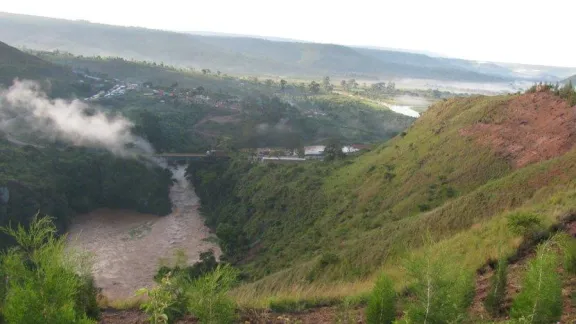
Rusumo falls, Rwanda, Tanzania border. Photo: Rev. John Rutsindintwarane
By Rev. John Rutsindintwarane
This year, Rwanda marked the 20th year since the genocide in that country in 1994.
It may seem to be a long time, but my memory is still fresh: when I witnessed more than 700,000 Rwandan refugees flooded into Tanzania at Benaco refugee camp, near Ngara in one single human wave, the biggest and fastest refugee movement I had ever witnessed [April 28].
Thanks to the [DWS associate program Tanganyika Christian Refugee Service/TCRS] great response in emergency situation that was almost perfect to save many lives of Rwandans. I volunteered to be translator at Benaco refugee camp during crisis, but truly my theology was enormously challenged. However, crisis vacuumed my brain, moral, and spiritual gift to shift to a new way of thinking and doing theology in time of crisis and a move towards repatriation, resettlement, reconstruction and a move towards sustainable development.
I challenge Rwandan and Tanzanian governments as well as churches to acknowledge great support that this unique organization has done to our people.
It is in this context that [this morning] I took a moment to reflect on the incredible LWF humanitarian assistance that incredibly saved our lives both in Tanzania and Rwanda; for sure I cannot take such support for granted. I may travel to Ngara to see the site of the mass grave where TCRS/LWF put to rest remains of Rwandans who were fished out of Kagera river [on the Rwanda/Tanzania border] by TCRS/LWF DWS late April, May and June in 1994.
On the Rwandan hillside of Rusumo falls on River Kagera, (Boynton & Rwamuhinda Hills), more than 40,000 trees have been planted as a sign of hope for the future for not only Rwandans but the global community.
Rev. John Rutsindintwarane is general secretary of the Lutheran Church of Rwanda (LCR) and a former refugee in Tanzania. He wrote this reflection for TCRS' 50th anniversary.
LWF’s solidarity with Rwanda started in 1994 as a "first-responder" on the scene after the genocide in July 1994, leading to the post-crisis reconstruction and peace building. After 15 years in the country—emergency and relief operations followed by nine years of development interventions—DWS phased out of Rwanda in June 2010 in compliance with the country’s Economic and Poverty Reduction Strategy.
The LCR, established in 1995 as a result of millions of refugees returning from Tanzania, has been an LWF member church since 2002.


